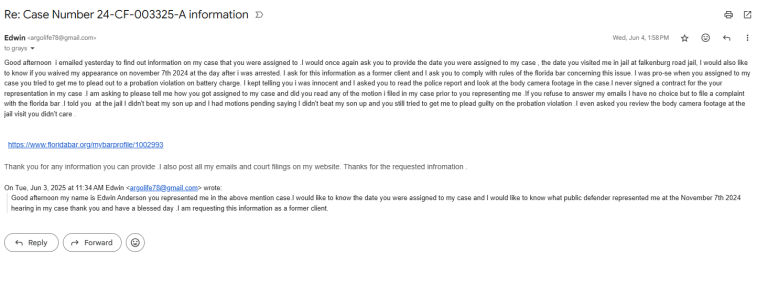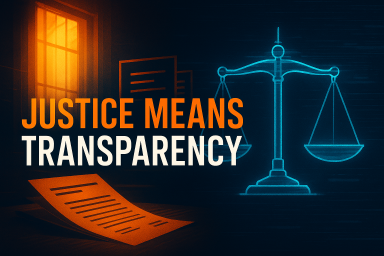UNLAWFULCONVICTIONS.ORG
Mr. Anderson’s right to access the courts has been obstructed at every turn.
Since the onset of his legal proceedings, Mr. Anderson has submitted numerous pro se filings, each raising valid constitutional claims, procedural irregularities, and evidentiary concerns. These filings have included motions, requests for discovery, and statements pointing to due process violations. Importantly, none of Mr. Anderson’s filings have been frivolous—they have directly addressed constitutional defects and included supporting documentation such as witness statements.
Despite these efforts, the court has repeatedly failed to recognize or rule on his filings, issuing only a partial ruling on a single matter while ignoring the rest. In addition, Mr. Anderson has emailed the clerk of court to seek clarity. The clerk, in turn, has contacted the judicial assistants for each judge involved in Mr. Anderson’s case. However, as of today, no action or response has been provided. Mr. Anderson remains in legal limbo.
Worse still, even while Mr. Anderson was incarcerated for a probation violation related to this very case, the court still refused to acknowledge any of his filings. These included witness statements that would have directly exonerated him and supported his claims of innocence. The court did not respond to motions, nor to emails from third parties who attempted to inquire about the status of his filings and constitutional arguments. Despiterepeated efforts by Mr. Anderson and others to bring these issues to the court’s attention, the court continues to detain him without addressing the violations that occurred at the beginning of these proceedings—violations that go to the heart of due process and a fair trial.
This sustained failure to respond constitutes not only bureaucratic neglect, but a clear and ongoing violation of Mr. Anderson’s constitutional right to access the courts.
Denial of Access to the Court – A Violation of Due ProcessThe right to access the courts is fundamental and well-established in constitutional law. The U.S. Supreme Court in Bounds v. Smith, 430 U.S. 817 (1977), held that:
“The fundamental constitutional right of access to the courts requires prison authorities to assist inmates in the preparation and filing of meaningful legal papers...”
This right is not limited to physical access—it includes the right to meaningful consideration of claims that challenge one’s conviction or incarceration.
In Lewis v. Casey, 518 U.S. 343 (1996), the Court clarified that this right is violated when an inmate is hindered from pursuing a non-frivolous legal claim related to their sentence or confinement. The Court emphasized that:
“The tools it requires to be provided are those that the inmates need in order to attack their sentences, directly or collaterally…”
Earlier, in Ex parte Hull, 312 U.S. 546 (1941), the Court ruled that:
“The state and its officers may not abridge or impair an inmate’s right to apply to a federal court for a writ of habeas corpus.”
Additionally, the Eleventh Circuit, which governs Florida, has recognized that failure to rule on inmate motions or engage with constitutional claims may amount to a due process violation. See Wilson v. Blankenship, 163 F.3d 1284, 1290–91 (11th Cir. 1998).
Application to Mr. Anderson’s Case
Mr. Anderson’s filings include compelling evidence and constitutional claims that, if heard, could alter the outcome of his case. These include claims of ineffective assistance of counsel, suppressed discovery, and witness statements offering exonerating testimony. The court’s repeated refusal to acknowledge or address these filings—despite being notified through official and informal channels—effectively blocks Mr. Anderson from challenging the legal foundation of his detention.
The court’s inaction during Mr. Anderson’s incarceration for a probation violation is especially egregious, as it resulted in the continued loss of liberty while key evidence of his innocence went unreviewed. No court has the constitutional authority to indefinitely ignore valid legal claims while continuing to detain the individual raising them.



We need your consent to load the translations
We use a third-party service to translate the website content that may collect data about your activity. Please review the details in the privacy policy and accept the service to view the translations.
